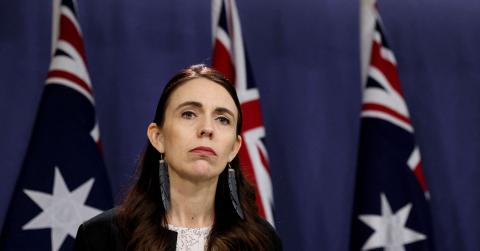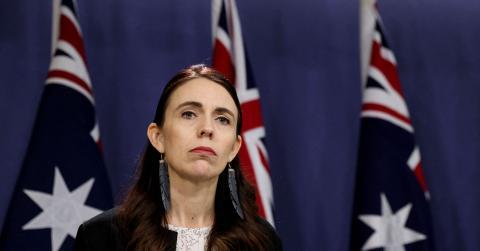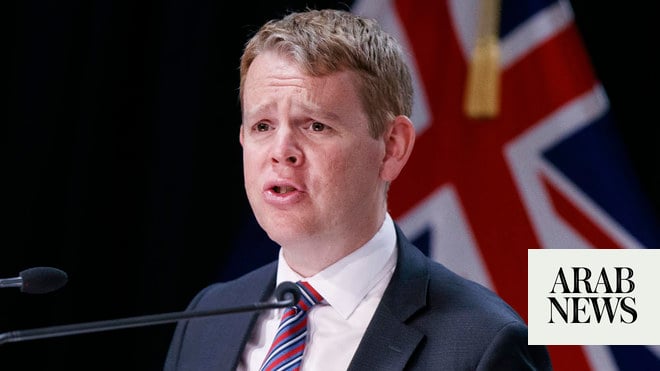
Jacinda Ardern, New Zealand’s prime minister, has remembered Queen Elizabeth II as “extraordinary” and announced a period of national mourning in remarks she made as New Zealanders woke to the news of the monarch’s death.
“Over her reign, she has come to define notions of service, charity and consistency,” Ardern told reporters at parliament in Wellington on Friday. Queen Elizabeth’s commitment to her role was “without question and unwavering,” Ardern said.
“She has also demonstrated courage, compassion and humour.”
Ardern said she had learned of the Queen’s death when a “police officer shone a torch into my room at around ten to five this morning”. She said she had been reading some of the accounts of the queen’s ill health before going to bed, so “when that torchlight came into my room I knew immediately what it meant”.
“I am profoundly sad,” she added.
Plans are under way for a state memorial service to be held in New Zealand after the Queen’s funeral, said Ardern, and a period of mourning would continue until then.
New Zealand’s flag will fly at half-mast until after the day of the Queen’s funeral, except on Proclamation Day, when it will fly at the top of the mast to mark the announcement of the new sovereign. Condolence books will be opened in New Zealand’s capital and in other locations throughout the country, and places will be designated for members of the public to leave flowers.
In an earlier statement released upon news of the Queen’s death, Ardern described her as “a much-respected constant through unprecedented global change.” Ardern expected New Zealanders would feel “deep sadness, but also deep gratitude” as they woke to the news.
Queen Elizabeth’s laughter and the “level of knowledge and care that she had for New Zealand” would be Ardern’s fondest memories of the monarch, she said, referring to a phone call between the pair during the country’s first Covid-19 lockdown in 2020.
“She called just to check on how New Zealand was doing,” Ardern said. “It was a very human conversation.”
Ardern had asked the Queen how she was passing the time, and she replied that she had been listening to an interview “with someone who was a political prisoner confined to a very small set space for decades,” Ardern said.
“She said to me: ‘You listen to that, and it makes one feel rather small.’”
Ardern added: “I think it’s easy to believe that when you’re in such a role that somehow you get a distance from others or from what it is to be human. I never ever got that sense from her.”
The Queen visited New Zealand ten times, the first over the summer of 1953-54 when she and the Duke of Edinburgh visited 46 cities and towns and attended 110 functions.
The first time Ardern met the Queen, the prime minister showed her a Polaroid image taken during a visit to New Zealand 50 years earlier, she said.
“I did not for a moment expect her to recall anything of the moment that photo was taken, but it showed her in the back of a vehicle laughing,” Ardern said. “Not only did she remember the visit, she could remember what was making her laugh.”
Queen Elizabeth had also given Ardern – who was the first head of state in recent years to give birth while in office – advice about balancing leadership with raising children, Ardern said.
New Zealand is among 16 Commonwealth nations to have the British monarch as its head of state, a minority among the 54 members – most of which are republics.
While contemporary New Zealand leaders have viewed a shift away from the monarchy as inevitable, most have expressed reluctance to suggest any kind of timeline, and public sentiment towards republicanism has been less marked than in neighbouring Australia.
Public debate about the possibility of New Zealand becoming a republic would “build up quite a head of steam now,” Sir Don McKinnon, a former deputy prime minister of Aotearoa and former secretary-general of the Commonwealth told Radio New Zealand.
“I can say from all the conversations I had with Her Majesty in her time, she was always prepared to say […] it’s entirely up to all of those realms […] where she’s head of state whether they want to stay that way.”
In 2021, Ardern told reporters that she believed the country would become a republic in her lifetime, but that she “never sensed urgency” from New Zealanders about the change.
“I do still think there will be a time and a place, I just don’t see it as now,” Ardern, who describes herself as a republican, said at the time.
The Crown’s representative in New Zealand also paid tribute on Friday.
“As Queen of New Zealand for 70 years, Her Majesty was an honoured monarch and an enduring presence through times of great change,” Dame Cindy Kiro, the governor general, said in a statement.
“Her Majesty The Queen was much loved and respected in New Zealand, and will be long remembered for her lifetime of dedicated service.”
Christopher Luxon, the leader of the parliamentary opposition and New Zealand’s centre-right National party, said the “strength and stability” of Queen Elizabeth’s leadership “was a reassuring anchor for New Zealand and New Zealanders in uncertain and changing times.”












